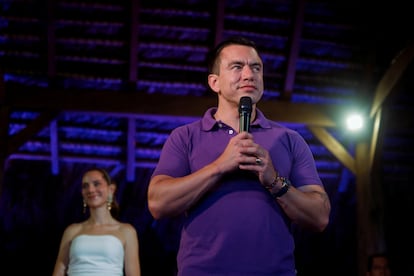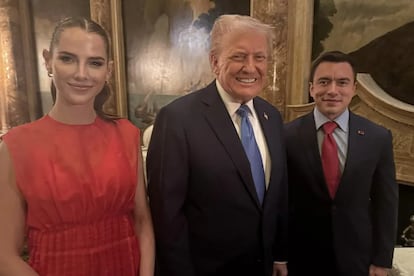The Trump effect and the mistakes of Correismo hand Daniel Noboa victory in Ecuador
The conservative president won re-election in a run-off against the leftist Luisa González by almost 12 points, a margin that no poll had anticipated


Ecuadorians woke up Monday in a state of disarray. President Daniel Noboa, a conservative, tied with leftist Luisa González until the final day of the campaign, had won reelection in the second round the day before with a 12-point lead, equivalent to nearly 1.2 million votes. Still in a state of shock, González, the candidate of former president Rafael Correa, faced the disaster with a claim of “grotesque electoral fraud,” which she failed to back with evidence and which was not endorsed by international observers. Even within her own party, Revolución Ciudadana, top leaders, including prominent governors and mayors who had supported the candidate on Sunday in the face of her defeat, were quick to acknowledge Noboa’s victory (with 55.6% of the vote to 44.3%). The wide margin has multiple causes, as varied as self-inflicted errors on the part of Correa’s party, the commitment to “a new way,” and, above all, an unexpected “Trump effect.”
Ecuador is dollarized. The tariff war that has turned the world upside down “is experienced here as its own problem, because Ecuadorians think with their dollars in their pockets,” says Caroline Ávila, a political analyst and academic. In this turbulent world, Noboa was able to offer himself as a better solution. On March 29, in the midst of the election campaign, the president visited Donald Trump at his Mar-a-Lago residence out of the blue. He said it wasn’t an official visit and that the U.S. president had asked him not to give “too many details.” Spokespeople for the Ecuadorian president, including his mother, a congresswoman, let it be known that they had spoken about security cooperation. There was Noboa, showing his voters that he had direct access to the White House and could use it if necessary.
Trump reinforced the bond on Monday with a congratulatory message in which he called Noboa “a great leader for the wonderful people of Ecuador.” On the other side, voters encountered a Correismo that had become stagnant in its fight against U.S. imperialism. “Luisa [González] showed nothing. Faced with the silence of the left, the only option was an empty right wing without results, but at least they had their photo op with Trump. Correa doesn’t even have a visa, and Revolución Ciudadana never said how it planned to resolve its relationship with the United States,” says Ávila. The Republican has already displayed that he treats his friends better, and Noboa is one of them.

González also suffered the effects of numerous unforced campaign errors. From Belgium, where he is in exile to avoid a corruption conviction he considers unfounded, Correa “criticized dollarization and defended [Venezuelan President] Nicolás Maduro,” says César Febres-Cordero, a political analyst and editorialist. Both are highly sensitive issues in Ecuador and forced the leftist candidate onto the defensive. “Between the first and second rounds, Luisa González underwent a sudden change of style, with many attacks against Venezuelan immigration, in an effort to make the topic of Venezuela less toxic. And then they baselessly accused her of wanting to de-dollarize,” says Febres-Cordero.
Noboa knew how to exploit these errors. He also succeeded in reviving the great specter that haunts Correismo — that of corruption — with the release of a series of compromising audio recordings from the candidate’s entourage. During the final days of the campaign, he went full throttle, taking advantage of his dual role as president and candidate. “He championed his position as leader,” says Sebastián Hurtado, president of the political risk consultancy Profitas. “He gave cash bonuses to hundreds of thousands of people, under the guise of compensating for damages from oil spills or floods. He also used national media chains to promote his security policy in the last week of the campaign,” he explains.
There was also the problem of violence, the issue of greatest concern in Ecuador. In less than four years, the Andean country has gone from being a bubble of peace to leading the regional statistics for homicides. Noboa came to power just over a year ago to complete the failed term of Guillermo Lasso, and within a few days he had already declared that the country was at war against the mafias. Two days before Sunday’s elections, he declared a state of emergency and a nightly curfew in seven of the country’s 24 provinces and in Quito. He was the president of the “iron fist,” even though his results were meager. Last January was the most violent month in Ecuador’s history, with nearly 900 murders. “It was a mistake by Correismo not to have a clear security plan. Noboa’s iron fist wasn’t successful, but that doesn’t mean the population rejects it,” says Ávila.
Despite all these signs, analysts failed to see the tsunami of votes in Noboa’s favor coming. The result is explained by González’s stagnation in the coastal provinces, strongholds of Correismo, and a significant loss of votes where Noboa had been strongest in the first round. Hurtado says the underlying problem was failing to see that “Ecuador is no longer the same as it was a year ago,” when Noboa also defeated González in early elections. “There is a deeper change in political sentiment that we are still not clear about. Noboa was in power for a year and is still seen as a leader who embodies hope for change and a new face of politics,” he asserts.
For Febres-Cordero, Noboa also seemed like “an option for calm, at worst, the devil you know.” “Logic tells you that a leader wears himself down, especially if there are no results,” Ávila adds, “which is why his victory hasn’t been due to positive results, but rather to fears of a threatening geopolitical context.” It’s clear that the president’s political capital is limited, based more on others’ mistakes than his own successes. Against this backdrop, Noboa will now face the challenge of building governability over the next four years.
Sign up for our weekly newsletter to get more English-language news coverage from EL PAÍS USA Edition
Tu suscripción se está usando en otro dispositivo
¿Quieres añadir otro usuario a tu suscripción?
Si continúas leyendo en este dispositivo, no se podrá leer en el otro.
FlechaTu suscripción se está usando en otro dispositivo y solo puedes acceder a EL PAÍS desde un dispositivo a la vez.
Si quieres compartir tu cuenta, cambia tu suscripción a la modalidad Premium, así podrás añadir otro usuario. Cada uno accederá con su propia cuenta de email, lo que os permitirá personalizar vuestra experiencia en EL PAÍS.
¿Tienes una suscripción de empresa? Accede aquí para contratar más cuentas.
En el caso de no saber quién está usando tu cuenta, te recomendamos cambiar tu contraseña aquí.
Si decides continuar compartiendo tu cuenta, este mensaje se mostrará en tu dispositivo y en el de la otra persona que está usando tu cuenta de forma indefinida, afectando a tu experiencia de lectura. Puedes consultar aquí los términos y condiciones de la suscripción digital.








































